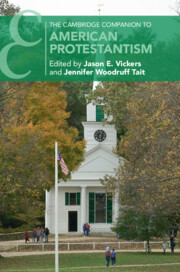Book contents
- The Cambridge Companion to American Protestantism
- Cambridge Companions to Religion
- The Cambridge Companion to American Protestantism
- Copyright page
- Dedication
- Contents
- Contributors
- Acknowledgments
- Introduction
- Part I Historical Overview
- Part II The Religious Culture of American Protestantism
- 5 Bible, Doctrine, and Theology
- 6 Worship and Preaching
- 7 Education
- 8 Work and Vocation
- 9 Politics and Government
- 10 Temperance
- 11 Gender, Sexuality, and Marriage
- 12 From Slavery to Black Lives Matter: American Protestants and Race
- 13 Faith Healing and Modern Medicine
- 14 Mental Illness
- 15 Protestant-Catholic Ecumenism and the Meanings of American Freedom
- 16 Missions
- Part III Theological Traditions
- Selected Bibliography
- Index
- Cambridge Companions to Religion (continued from page ii)
14 - Mental Illness
from Part II - The Religious Culture of American Protestantism
Published online by Cambridge University Press: 11 May 2022
- The Cambridge Companion to American Protestantism
- Cambridge Companions to Religion
- The Cambridge Companion to American Protestantism
- Copyright page
- Dedication
- Contents
- Contributors
- Acknowledgments
- Introduction
- Part I Historical Overview
- Part II The Religious Culture of American Protestantism
- 5 Bible, Doctrine, and Theology
- 6 Worship and Preaching
- 7 Education
- 8 Work and Vocation
- 9 Politics and Government
- 10 Temperance
- 11 Gender, Sexuality, and Marriage
- 12 From Slavery to Black Lives Matter: American Protestants and Race
- 13 Faith Healing and Modern Medicine
- 14 Mental Illness
- 15 Protestant-Catholic Ecumenism and the Meanings of American Freedom
- 16 Missions
- Part III Theological Traditions
- Selected Bibliography
- Index
- Cambridge Companions to Religion (continued from page ii)
Summary
This chapter traces developments in American Protestant responses to mental illness. The professionalization of medicine, shifting theological emphases, and cultural forces shaped reactions that ranged from benign neglect by many to impassioned advocacy by a few. Christians enter the narrative in various roles: ministers, physicians, sufferers, family members, advocates, seminary professors, and a variety of mental health professionals. The identities of some spanned those categories. Across time, churchgoers and religious leaders deployed terms for distress that included distraction, possession, madness, melancholy, insanity, mental illness, and later, diagnostic terms such as depression, bipolar disorder, post-traumatic stress disorder, and schizophrenia. Regardless of labels, as individuals and groups of believers thought about mental illness, sought meaning, and responded amid distress, their context-specific claims of what seemed awry shaped assessments of how best to deploy available resources.
Keywords
- Type
- Chapter
- Information
- The Cambridge Companion to American Protestantism , pp. 260 - 276Publisher: Cambridge University PressPrint publication year: 2022

